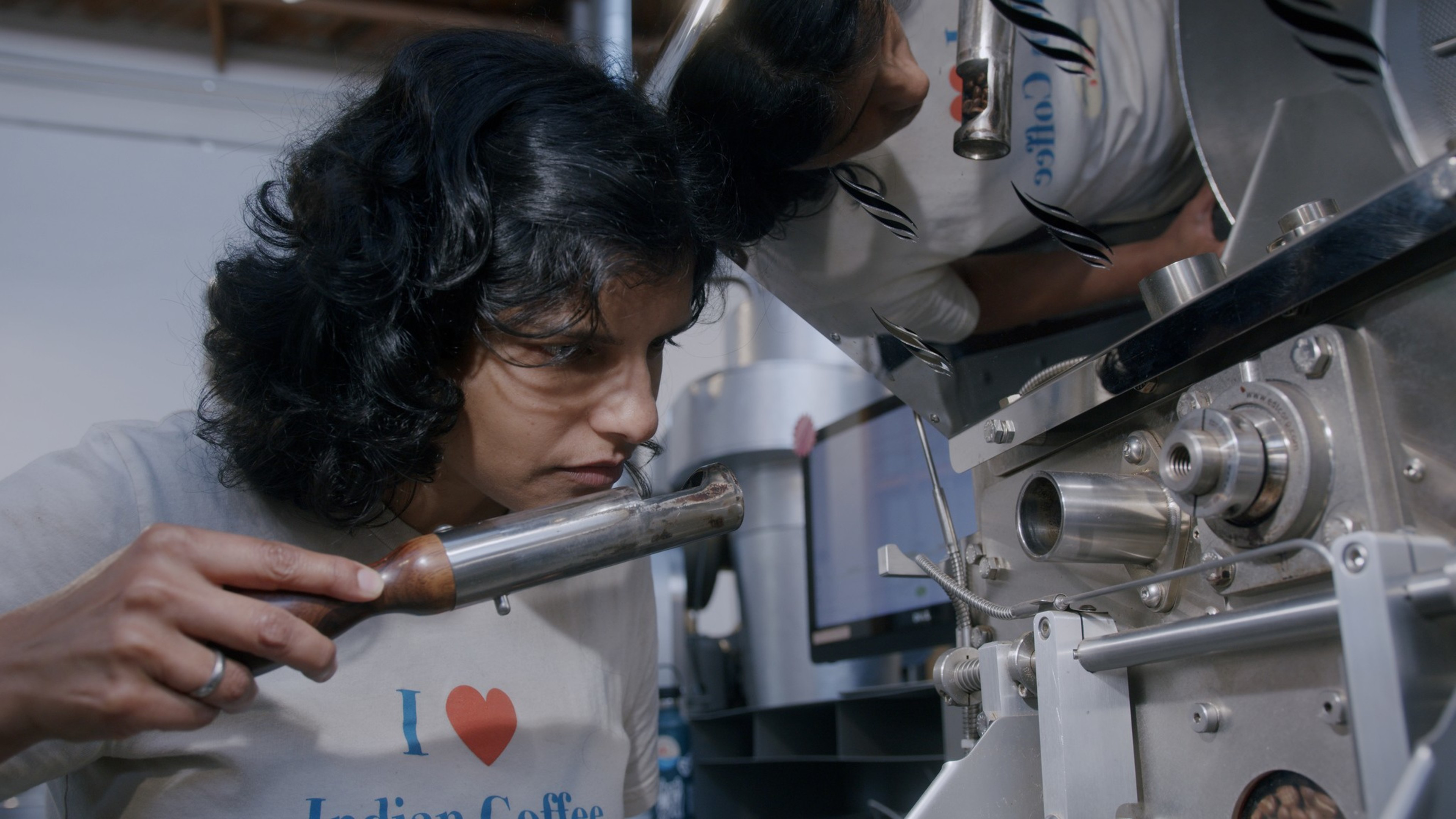The toasty smell of roasting coffee wafts out as Tanya Rao leans over a spiraling pool of ever-darkening beans. Around her, other roasters hunch over their own whirring machines, surrounded by bags of finished product.
Rao has been working out of CoRo (opens in new tab), a coffee collaborative in southwest Berkeley, since 2019, when she launched Kaveri Coffee Works (opens in new tab), one of dozens of roasting businesses that call the enormous space home.
The Bay Area has a long history of pioneering coffee businesses: Legendary roasters Sightglass (opens in new tab), Four Barrel (opens in new tab), and Ritual (opens in new tab) all started here in the early aughts. But in the last five or so years, roasting co-ops — among them, CoRo, Oakland’s 444 (opens in new tab) and Pulley Collective, (opens in new tab) and San Francisco’s The Archery (opens in new tab) — have fostered a class of up-and-comers, offering affordability through shared resources.


These spaces are not co-ops in the literal sense of being member-owned businesses. But they have the same kumbaya vibe: inclusive and communal, with an accessible point of entry. In this specialty world of earnest microroasters, ethical sourcing is often a priority, keeping costs low is paramount, and community is everything.
444 in Oakland, for example, is the roasting home for a dozen specialty operations at various stages of growth. There’s Signal (opens in new tab), which has four brick-and-mortar cafes in Berkeley and Alameda; the trans- and Indigenous-run Queer Wave Coffee (opens in new tab); Haight Street’s Coffee Out There (opens in new tab); and cult-favorite Hydrangea Coffee Roasters (opens in new tab), which sells a half pound of Colombian Gesha (opens in new tab) for an eyebrow-raising $44.
With access to communal space and equipment, plus a cohort of other small-business owners to lean on, the facilities make starting or growing a coffee company relatively easy. Combine that with low- and no-cost online marketing tools and a bevy of educational opportunities — everything from podcasts (opens in new tab) to digital workbooks (opens in new tab) to in-person classes (opens in new tab) with coffee pro Trish Rothgeb — and the facilities make starting a roasting business cheaper than ever before. The result? A new class of scrappy companies, making some of the most exciting coffees in the Bay.

At CoRo, members have access to an array of roasting and processing equipment, available to rent on a sliding price scale based on the type of gear and how long it’s needed. Kaveri coffees, for instance, are roasted on one of the 15kg Loring (opens in new tab) machines. Rao uses one to produce about 150 pounds of Indian coffee every two weeks. Like many of the businesses operating out of these co-ops, Kaveri is a deeply personal project — with a mission that goes beyond brewing a great cup. Rao grew up in Karnataka, one of southwestern India’s most important coffee regions (opens in new tab); for her, Kaveri is a way to shine a light on the quality of her home country’s beans.
Bill Li, meanwhile, credits online tools and classes — specifically, an intro to roasting class with Willem Boot (opens in new tab) — with catapulting him from would-be roaster to specialty-coffee wunderkind. During the pandemic, rather than baking sourdough, he became fascinated with roasting; in 2020, he bought a 10-pound box of green coffee beans and started practicing in the kitchen on a tiny, affordable IKAWA machine.
His business, Hydrangea Coffee Roasters (opens in new tab), wouldn’t exist without CoRo, where he works just one day a week on a 5kg Probat roaster, producing about six pounds of coffee ready to sell. He’s somewhat of a niche producer, focusing on light roasts. But fans cross bridges for Hyrangea’s extremely rare co-fermented beans (opens in new tab) that burst with the flavor of Jolly Ranchers and papaya. Li isn’t the only Bay Area roaster working with co-ferments, but he’s one of the most notable.


Sunset Roasters (opens in new tab), run by husband-and-wife duo Phillip and Sara Roliz, has roasted at both CoRo and Archery. Like many of the businesses that work out of these shared roasting spaces, it’s deeply personal to the owners. Sunset, which sells drinks out of a truck at farmers markets, is known for options including pinolillo con café and an horchata latte with a cinnamon marshmallow, nods to the owners’ backgrounds: Sara is Mexican American, with roots in the Los Angeles area, and Phillip is Chinese, Portuguese, Nicaraguan, and Brazilian.
Phillip estimates that the cost of starting and maintaining a coffee business — build-outs and roasting equipment and beans — is 30% higher in San Francisco than in other cities. “There’s times I look at my wife, and I say, ‘I think we’re doing the hardest two things you can do in San Francisco: raising kids and running a small business,’” he says.
But the camaraderie of the shared roasting spaces, where the couple produce bags of natural-processed Ethiopia Adinew (opens in new tab), helps keep him going. “It’s such a tight-knit community,” Phillip says. “In a world where real estate is so expensive, where labor is so expensive, we eat the cost together.”
